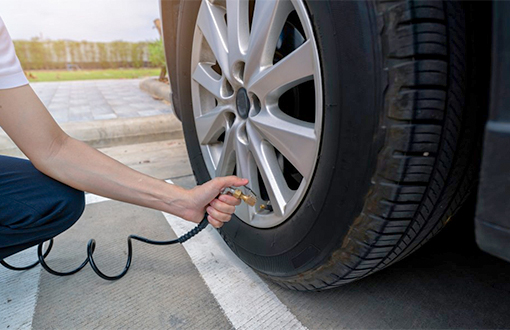No items in cart right now!
Working Hours - 8 AM To 8 PM
 February 18
February 18
Properly inflated tyres are vital for your vehicle's performance, safety and fuel economy. Many drivers neglect this simple yet all-important task and it results in uneven tire wear, less handling and poorer fuel consumption. In this guide, we have everything you need to know about the right inflation for the maximum drive.
Your vehicle tyres are the only contact part with the road. Tyre under inflation can affect your car in numerous ways:
Safety: Too low pressured tyres may overheat and can lead to a blowout, too highly pressured tyres show less grip, and braking becomes less effective.
Fuel Efficiency: Properly inflated tyres reduce the rolling resistance on the road, so the car requires less fuel to achieve a certain mileage which ultimately implies that there would be fuel saved.
Maintenance: Optimizing tyre pressure prolongs tyre life and therefore cuts replacement costs.
Overall Fit and Comfort: Satisfaction is about the appropriate pressure which means more stability, handling and ride.
Regularly checking inflation, and adjusting your tyre pressure is crucial for good inflation. Here is how to do it the right way:
The correct pressure levels for your car are specified by the car manufacturer and can usually be found:
Inside the driver’s door panel.
In the vehicle manual.
On the fuel cap cover.
The pressure is measured in PSI (lpa or pounds psi) or BAR. Make sure to review the manufacturer's shown recommendations for optimal performance and purpose.
Buy a good quality tyre pressure gauge to get the correct reading. Digital gauges give exact readings and are simpler to use than digital ones.
Tyre pressure should always be checked when the tyres are cold, otherwise, heat in the air inside the tyres can cause them to seem inflated when in fact they are not. Wait for at least three hours after you have driven before treating.
If the pressure is too low, use an air compressor to inflate the tyres in a step, but continue to improve the attack charge to be sure.
If the pressure is too high, let some air out by pressing the valve stem until you attain the recommended point.
Numerous drivers tend to make a few critical mistakes when it has to do with inflating their tyres, which can meaningfully coincide with a potential decrease in performance and safety. Avoid these common errors:
Over Inflating: Causes wear on the centre tread, decreases in grip and makes the ride very uncomfortable.
Under-inflating: Causes the tyres to degrade fast, lowers the fuel efficiency and raises the risk of tyre blowouts.
Disregarding Temperature Changes: Air is hotter in warm weather and cooler in cool weather. Adjust the pressure on an annual basis.
Forgan Tinggi Brake Fluid Test and Top-Up: Use the correct method to gain access to various components of the brake system.
Following these best practices ensures your tyres stay in optimal condition:
Check Pressure Weekly: Frequent checks help maintain proper inflation and improve performance.
Use Nitrogen Instead of Air: Nitrogen maintains pressure longer and reduces temperature fluctuations.
Adjust for Load: If carrying heavy loads, increase tyre pressure slightly for better stability.
Inspect for Leaks: Regularly check valves and treads for punctures or slow leaks.
Rotate tyres Regularly: Rotating your tyres every 5,000-7,500 miles ensures even wear and enhances safety.
Maintaining proper inflation significantly enhances overall vehicle performance:
Better Braking: The right pressure ensures shorter braking distances.
Improved Cornering Stability: Properly inflated tyres enhance grip and stability when turning.
Optimized Tread Wear: Reduces uneven wear and prolongs tyre life.
Reduced CO2 Emissions: Lower rolling resistance leads to better fuel economy and fewer emissions.
Even with proper inflation, tyres wear out over time. Look for these warning signs:
Tread Depth Below 1.6mm: Reduced grip and increased hydroplaning risk.
Cracks or Bulges: Indicate internal damage and require immediate replacement.
Persistent Pressure Loss: This could be due to a slow leak or valve issue.
Vibrations While Driving: Suggests misalignment or internal tyre damage.
Proper tyre inflation is very important for the safety & fuel efficiency & performance of vehicles. Regular pressure checks, not making the same mistakes time and time again and following best practices on how to keep your tyres perfectly maintained will guarantee you a top condition on your tyres.
At Etarat Online, we offer experienced tyre solutions to keep a correct inflation and the best enhancing driving experiences. Stay safe and use fuels miserly with regular truck tyres intelligently inflated on all occasions!
leave a comment